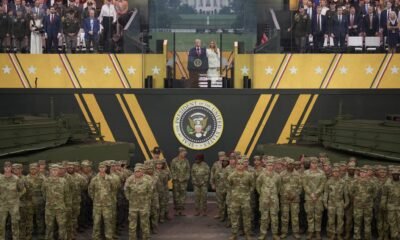Brian E. Murphy
Judge Claims Trump Administration Flouted Deportation Order, Ignoring Due Process

WASHINGTON — A federal judge in Boston found the Trump administration in violation of a preliminary injunction against deporting migrants to third countries without due process. Immigration lawyers reported that clients were placed on flights headed to South Sudan.
U.S. District Judge Brian E. Murphy stated, “It was impossible for these people to have a meaningful opportunity to object to their transfer.” He emphasized the government’s actions were clear violations of his court order.
Murphy plans to formulate a remedy for the eight men involved, noting they were given less than 24 hours to contest their deportation. South Sudan, which is experiencing severe violence, is deemed unfit for travel by the U.S. State Department.
While the Department of Justice did not confirm the flight’s destination, tracking data indicated it may have landed in Djibouti. Murphy requested a list of individuals who facilitated the flights for potential sanctions.
This incident reflects ongoing tensions between the Trump administration and the judiciary over immigration enforcement practices as the administration pushes for mass deportations.
In response, the White House labeled Murphy a “far-left activist judge,” alleging he aims to protect migrants with criminal records. According to the administration, the group on the flight included individuals from various countries including Cuba, Laos, and Vietnam.
Even as Department of Homeland Security officials defended the operation, they stopped short of confirming the migrants’ destination, claiming it was not their “final destination.” U.S. Immigration and Customs Enforcement (ICE) Acting Director Todd Lyons stated South Sudan had agreed to accept these individuals.
A DHS spokeswoman characterized the removed individuals as “some of the most barbaric violent individuals illegally in the United States.” She insisted they remained in custody.
Judge Murphy, appointed by President Joe Biden, has not mandated the return of the men but inquired whether credible fear interviews could be conducted. Immigration attorneys argued for their return to the U.S. DOJ attorney Drew Ensign countered that such a remedy would be overly broad, asserting 24 hours is sufficient for an immigrant to contest a removal.
Trina Realmuto from the National Immigration Litigation Alliance proposed extending this timeframe to at least 30 days, as many lacked legal representation. Murphy promised to clarify the necessary time frame and warned of potential contempt charges for those involved in the removals.
In a late Tuesday emergency hearing, Murphy ordered the government to keep the migrants in custody pending more information. His April order prohibits removals without allowing individuals time to address possible risks in third countries.
Sending migrants to South Sudan raises concerns similar to deportations to Libya, noted for its history of violence. The administration had previously granted Temporary Protection Status to South Sudanese nationals, allowing them to stay in the U.S. due to unsafe conditions in their home country.
The judge previously warned that deporting individuals to high-risk countries would contravene his April injunction. This situation is part of a broader pattern of clashes between federal judges and the Trump administration.
Numerous federal judges have criticized the administration for lack of transparency in immigration matters, including cases involving wrongly deported individuals. Recently, the Supreme Court rejected another request from the Trump administration to circumvent due process concerns in deportations involving gang-related accusations.

















